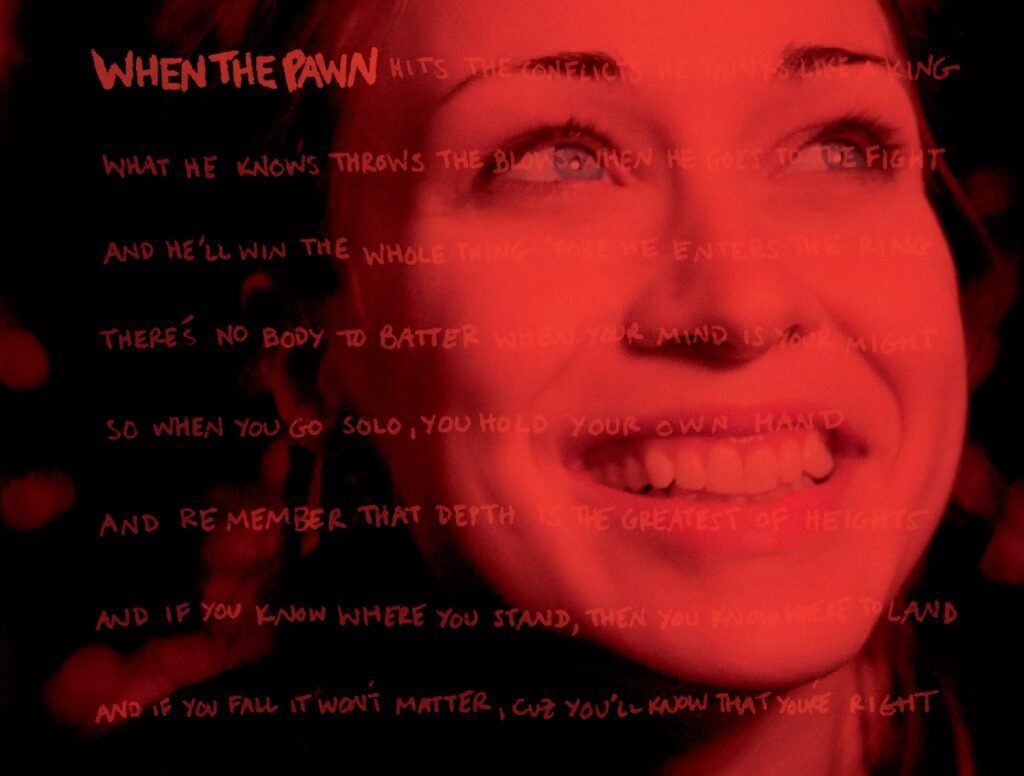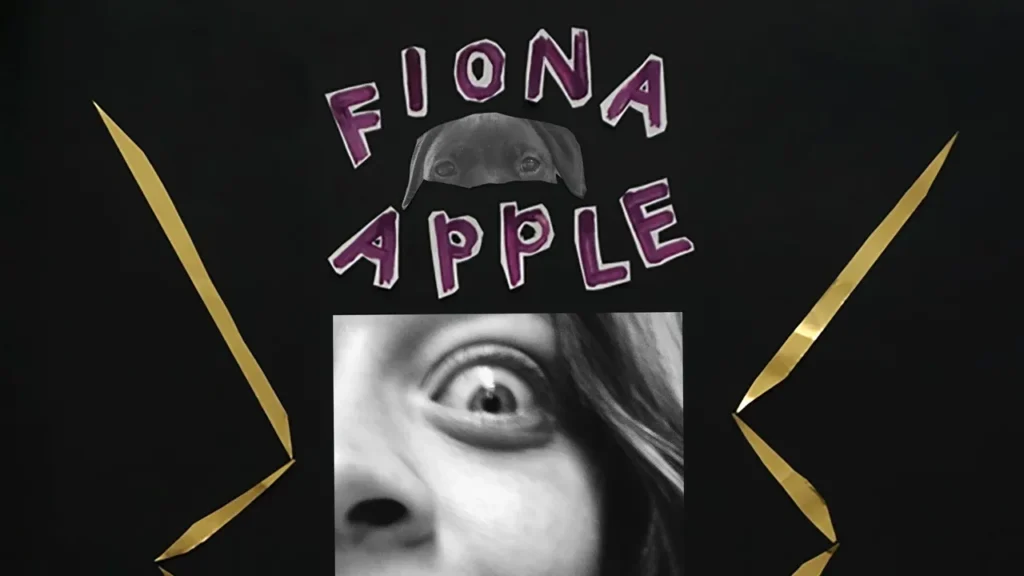In the realm of contemporary music, few artists have consistently bared their soul as unapologetically and compellingly as Fiona Apple. With lyrics that cut to the bone and a voice that reverberates with raw emotion, Apple has carved out a space for herself as a fearless storyteller of the human condition. As she once poignantly remarked, “I’m just a girl with a piano trying to capture my emotions.” Her music is a testament to this quest, resonating deeply with listeners who find solace and solidarity in her candid expressions of inner turmoil and triumph.
Over the span of her illustrious career, Fiona Apple’s lyrical themes have undergone a profound transformation. Initially marked by anger and frustration, her songs have gradually shifted towards acceptance and self-discovery. This evolution reflects not only her personal growth but also a broader narrative of emotional resilience and maturation.
Early Career: Raw Emotions and Anger
Debut Album “Tidal”

Fiona Apple’s debut album, Tidal, released in 1996 when she was just 19 years old, is a masterclass in raw emotion and unfiltered expression. The album’s most iconic tracks, “Criminal” and “Sleep to Dream,” bristle with themes of anger, betrayal, and frustration, marking Apple as a bold new voice in alternative rock. “Criminal,” with its sultry piano riffs and defiant lyrics, delves into the complexities of guilt and self-recrimination. Apple’s repeated plea, “What I need is a good defense, ’cause I’m feeling like a criminal,” captures a tortured interplay between defiance and remorse, painting a portrait of someone grappling with the consequences of their actions.
In “Sleep to Dream,” Apple’s rage is palpable. She declares, “I tell you how I feel, but you don’t care. I say tell me the truth, but you don’t dare.” This song is a scathing indictment of unreciprocated emotional labor and deceit. The ferocity in her voice, coupled with the aggressive piano and drum arrangements, underscores a profound sense of betrayal and frustration. Tidal doesn’t shy away from the darker corners of Apple’s psyche, offering listeners a raw, unvarnished look at her inner world.
Context
The personal and cultural backdrop of Tidal is crucial to understanding its intensity. Apple’s childhood was marked by trauma, including a highly publicized assault at the age of 12, which profoundly influenced her outlook on life and music. This personal history of pain and resilience permeates her early work, giving it a depth and authenticity that resonated with many listeners.
Culturally, the mid-90s music scene was ripe for Apple’s arrival. The alternative rock and singer-songwriter movements were thriving, with artists like Alanis Morissette and Tori Amos paving the way for emotionally honest female voices. However, Apple’s distinct blend of jazz, rock, and baroque pop, combined with her willingness to tackle uncomfortable emotions head-on, set her apart from her contemporaries. Her candidness in interviews and her refusal to conform to industry norms also fueled her reputation as an uncompromising artist.
Lyrics Analysis
The lyrics of Tidal are a window into Apple’s tumultuous emotional landscape. In “Criminal,” lines like “Heaven help me for the way I am, save me from these evil deeds before I get them done” reveal a deep self-awareness and internal conflict. The song’s chorus, “I’ve been a bad, bad girl,” juxtaposes a sense of guilt with a provocative embrace of her flaws, challenging the listener to confront their own moral ambiguities.
“Sleep to Dream” offers no such reconciliation. Instead, it is a full-throated expression of disillusionment and anger. Apple’s scornful delivery of “Don’t even think about your freedom, or taking that flight, or going back upon your promise after fighting for the right” speaks to a deep-seated frustration with broken promises and emotional betrayal. The song’s closing lines, “This mind, this body, and this voice cannot be stifled by your deviant ways,” serve as a powerful declaration of self-assertion and resistance against those who have wronged her.
Middle Period: Complexity and Contradictions
“When the Pawn…” Album

Fiona Apple’s sophomore album, When the Pawn… (1999), whose full title is a poetic mouthful, marked a significant step forward in her artistic evolution. This album delves deeper into the complexities of her emotions, blending anger with introspection and vulnerability. Unlike her debut, which was steeped in raw and direct expressions of frustration, When the Pawn… reveals a more nuanced exploration of her psyche. The album’s production, helmed by Jon Brion, adds layers of sophistication to Apple’s sound, creating a rich tapestry that complements her intricate lyrics.
Thematic Shifts
In “Fast as You Can,” Apple navigates the turbulent waters of a tumultuous relationship, expressing both frustration and self-awareness. The song’s frenetic pace and shifting tempos mirror the chaotic nature of her emotions. Apple sings, “I let the beast in too soon, I don’t know how to live without my hand on his throat,” acknowledging her own complicity in the relational turmoil while also grappling with the desire to escape it. The song’s dynamic structure, shifting from intense verses to a more reflective chorus, underscores the internal conflict she experiences.
“Paper Bag” is another standout track that exemplifies the thematic complexity of When the Pawn…. The song juxtaposes moments of hope and disillusionment, encapsulated in the poignant line, “Hunger hurts, but starving works when it costs too much to love.” Here, Apple lays bare the pain of unmet expectations and the coping mechanisms she employs to manage her emotional hunger. The song’s upbeat tempo and jazzy piano riffs contrast with the melancholy of the lyrics, highlighting the contradictions inherent in her emotional state.
Musical Evolution
Musically, When the Pawn… represents a significant evolution from Tidal. While her debut album leaned heavily on piano-driven rock with a raw edge, her sophomore effort incorporates a broader palette of sounds and influences. Jon Brion’s production brings in lush orchestral arrangements, quirky percussive elements, and a more adventurous approach to song structure. This musical sophistication mirrors the complexity of Apple’s lyrical themes, offering a more textured and layered listening experience.
For instance, “A Mistake” features unconventional rhythms and dissonant chords that reflect the song’s themes of regret and self-recrimination. The use of vibraphones and other eclectic instruments adds a whimsical yet unsettling quality to the track. Similarly, “I Know,” the album’s closing track, strips down to a minimalist arrangement, allowing Apple’s voice and the emotional weight of her lyrics to take center stage. This stark simplicity contrasts with the more elaborate production found elsewhere on the album, showcasing her ability to convey profound emotion with just a few elements.
Later Career: Acceptance and Self-Discovery
“Extraordinary Machine” and Beyond

Fiona Apple’s later career, marked by albums like Extraordinary Machine (2005) and The Idler Wheel… (2012), showcases a significant shift in her lyrical themes towards acceptance and self-discovery. These works reflect an artist who has moved beyond the raw anger and complexity of her earlier years to embrace a more nuanced understanding of herself and her emotions. The evolution is palpable, with Apple’s music becoming a vessel for personal growth and introspection.
Extraordinary Machine was a pivotal album, representing a departure from the darker tones of her previous work. This album exudes a sense of resilience and self-assuredness, underscored by Apple’s willingness to confront her vulnerabilities with a newfound clarity. Similarly, The Idler Wheel…, with its full title The Idler Wheel is Wiser than the Driver of the Screw and Whipping Cords Will Serve You More than Ropes Will Ever Do, continues this trajectory. It is an introspective masterpiece that delves into themes of identity, self-worth, and emotional resilience.
Key Songs
The title track of Extraordinary Machine encapsulates this period of transition. With lyrics like, “I seem to you to seek a new disaster every day, you deem me due to clean my view and be at peace and lay,” Apple acknowledges her past struggles while expressing a resolve to move forward with optimism. The song’s whimsical arrangement, featuring orchestral flourishes and playful melodies, mirrors this sense of buoyancy and hope. It’s a declaration of self-reliance and resilience, highlighting her journey towards acceptance.
“Every Single Night,” from The Idler Wheel…, is a poignant exploration of Apple’s inner life, where she grapples with her thoughts and emotions. The lyrics, “Every single night’s a fight with my brain,” reveal an ongoing battle with self-doubt and mental anguish. Yet, there is a sense of catharsis in her admission, as if voicing these struggles is a step towards mastering them. The minimalist arrangement, centered around a simple, haunting melody, allows her voice and words to take precedence, underscoring the intimacy and raw honesty of the song.
Lyrical Maturity
The lyrical maturity evident in Apple’s later work is striking. Her songs demonstrate a deeper understanding of her emotions and experiences, often embracing contradictions and complexities rather than shying away from them. In Extraordinary Machine and The Idler Wheel…, Apple’s lyrics are less about assigning blame or expressing anger and more about introspection and acceptance. She delves into her psyche with an unflinching honesty, yet there is a softness and grace in her approach that was less apparent in her earlier albums.
For example, in “Valentine” from The Idler Wheel…, Apple sings, “I made it to a dinner date, my teardrops seasoned every plate,” blending vulnerability with a wry sense of humor. This line captures the bittersweet nature of her reflections, highlighting her ability to find beauty and meaning in her struggles. Similarly, in “Werewolf,” she acknowledges the dual nature of relationships with the line, “I could liken you to a werewolf the way you left me for dead, but I admit that I provided a full moon.” This balanced perspective, recognizing her own role in the dynamics, speaks to a mature, self-aware approach to songwriting.
Recent Work: Full Circle and Continued Growth
“Fetch the Bolt Cutters”

Fiona Apple’s 2020 album, Fetch the Bolt Cutters, represents the culmination of her lyrical and emotional journey, blending elements of anger, acceptance, and empowerment into a cohesive and powerful narrative. The album, which was largely recorded at her home in Venice Beach, California, during a period of relative isolation, showcases Apple at her most raw and unfiltered. The title itself, a line from the British TV crime drama The Fall, symbolizes a call for liberation and breaking free from constraints, setting the tone for the album’s themes.
Themes of Liberation
The title track, “Fetch the Bolt Cutters,” is a rallying cry for breaking away from past traumas and societal expectations. Apple sings, “Fetch the bolt cutters, I’ve been in here too long,” expressing a profound need for liberation and self-empowerment. The song’s minimalist production, featuring percussive sounds made from household objects and layered vocal harmonies, emphasizes a sense of intimacy and immediacy, drawing listeners into Apple’s world of defiance and resilience.
“Shameika,” another standout track, delves into themes of self-worth and empowerment. The song recounts a childhood experience with a schoolmate named Shameika, who told Apple she had potential. This simple affirmation becomes a mantra of self-empowerment, with Apple repeatedly asserting, “Shameika said I had potential.” The track’s rhythmic complexity and dynamic vocal delivery highlight the transformative power of those words, turning a childhood memory into a powerful statement of self-belief and resilience.
Cultural Impact
Fetch the Bolt Cutters received widespread critical acclaim upon its release, hailed as a groundbreaking work that solidified Fiona Apple’s status as a visionary artist. The album’s raw production, experimental approach, and deeply personal lyrics resonated with listeners and critics alike, earning it a perfect score from several prominent music publications. The album also won the Grammy Award for Best Alternative Music Album, further cementing its impact on the music industry.
Critics praised the album for its fearless exploration of emotional and social themes, with many noting its timely relevance in a world grappling with issues of isolation, empowerment, and societal change. Apple’s willingness to confront her past traumas and assert her voice in such a candid and unvarnished manner struck a chord with a wide audience, inspiring a new generation of listeners and artists.
The cultural impact of Fetch the Bolt Cutters extends beyond its critical acclaim. The album has influenced contemporary discussions around mental health, trauma, and personal growth, encouraging more open and honest conversations about these topics. Apple’s bold approach to songwriting and production has also inspired other artists to experiment with more unconventional and authentic methods in their music.
Comparative Analysis

Evolving Vulnerability
Fiona Apple’s evolution as a lyricist is marked by a profound shift in how she expresses vulnerability, transitioning from raw anger to nuanced acceptance. Comparing specific lyrics from different periods of her career highlights this transformation.
In her debut album Tidal, Apple’s vulnerability is often entwined with anger and defiance. In “Sleep to Dream,” she sings, “I tell you how I feel but you don’t care / I say tell me the truth but you don’t dare.” These lines convey a sense of betrayal and frustration, a direct and confrontational expression of her emotional state.
Moving to her sophomore album When the Pawn…, we see a blend of anger with introspection. In “Paper Bag,” Apple reflects on her emotional hunger and disappointment with the line, “Hunger hurts, but starving works when it costs too much to love.” This lyric showcases her growing complexity, as she acknowledges the pain of unfulfilled desires while also contemplating the cost of vulnerability.
In Extraordinary Machine, the tone shifts towards resilience and self-reliance. The title track includes the line, “I still only travel by foot and by foot, it’s a slow climb / But I’m good at being uncomfortable, so I can’t stop changing all the time.” Here, Apple embraces her discomfort as part of her journey, reflecting a more mature acceptance of her struggles.
By the time we reach Fetch the Bolt Cutters, Apple’s lyrics demonstrate a liberated and empowered vulnerability. In “Shameika,” she sings, “Shameika said I had potential,” turning a childhood memory into a powerful affirmation of self-worth. This line encapsulates her journey from external validation to internal confidence, illustrating her evolved perspective on vulnerability.
Artistic Growth
Fiona Apple’s approach to vulnerability and emotional expression has grown more sophisticated over time, mirroring her personal growth and artistic maturation. In her early work, vulnerability often manifests as unfiltered emotion, characterized by directness and intensity. This rawness resonates with listeners who identify with her unrestrained expressions of anger and pain.
As Apple’s career progresses, her lyrical approach becomes more introspective and layered. When the Pawn… showcases her ability to balance anger with reflection, using metaphor and intricate wordplay to convey her emotions. This album marks a significant development in her songwriting, introducing more complexity and depth to her narratives.
In Extraordinary Machine, Apple’s lyrics reflect a greater sense of self-awareness and resilience. Her vulnerability is no longer just about expressing pain; it’s about understanding and embracing it as part of her identity. This shift is accompanied by more elaborate musical arrangements and experimentation, enhancing the emotional resonance of her songs.
The Idler Wheel… further refines her lyrical sophistication. Apple delves deep into her psyche, using minimalist arrangements to draw focus to her introspective and often poetic lyrics. Her vulnerability is articulated through vivid imagery and nuanced storytelling, creating a more intimate and personal connection with her audience.
With Fetch the Bolt Cutters, Apple reaches a new level of artistic maturity. Her lyrics are both raw and polished, blending candidness with artistry. She tackles themes of liberation and self-empowerment with a confidence that reflects her journey towards acceptance. The album’s experimental production and unconventional soundscapes highlight her fearless approach to music, reinforcing the authenticity of her emotional expression.
Summary of Evolution

Fiona Apple’s lyrical journey from her debut album Tidal through her most recent work, Fetch the Bolt Cutters, illustrates a remarkable evolution from anger and frustration to acceptance and self-discovery. In Tidal, Apple introduced herself with raw, unfiltered expressions of betrayal and defiance. Her sophomore album, When the Pawn…, added complexity and introspection, blending her anger with deeper reflections on her emotional state. With Extraordinary Machine and The Idler Wheel…, Apple shifted towards themes of resilience and self-awareness, using her vulnerability as a tool for understanding and growth. Finally, Fetch the Bolt Cutters embodies her liberation and empowerment, showcasing a mature artist who embraces her past and confidently forges her path forward.
Impact on Listeners
Fiona Apple’s evolving lyrical themes have deeply resonated with her audience, offering a mirror to their own emotional journeys. Her candid exploration of pain, resilience, and self-discovery has provided solace and inspiration to many, particularly those who see their struggles reflected in her music. Apple’s willingness to confront difficult emotions head-on has created a powerful connection with listeners, fostering a sense of shared experience and understanding.
Moreover, her influence extends beyond her immediate fanbase to impact other artists. Apple’s fearless approach to songwriting, characterized by her refusal to shy away from vulnerability, has inspired a new generation of musicians to embrace their own emotional truths. Her innovative use of unconventional sounds and production techniques has also paved the way for more experimental approaches in contemporary music.
Final Thoughts
Fiona Apple’s journey through anger, introspection, acceptance, and empowerment offers profound insights into the power of music and personal growth. Her ability to transform personal pain into artistic expression highlights the cathartic and transformative potential of music. Through her evolving lyrics, Apple teaches us that confronting and embracing our vulnerabilities can lead to profound self-discovery and resilience. Her career stands as a testament to the enduring power of authenticity in art, reminding us that true strength lies in the courage to be honest with ourselves and others.
In a world where emotional complexity is often overlooked, Fiona Apple’s music serves as a beacon of truth and introspection. Her journey encourages us to face our own emotions with the same bravery and honesty, ultimately finding acceptance and empowerment in the process. As she continues to evolve as an artist, Apple remains a powerful voice in contemporary music, offering a timeless lesson in the beauty of personal growth and the healing power of art.
